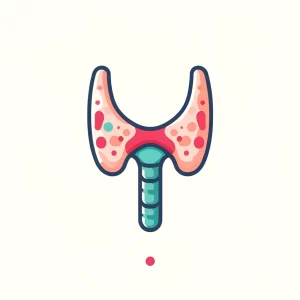Understanding the TSH Blood Test
The Thyroid-Stimulating Hormone (TSH) blood test is a crucial diagnostic tool used to assess thyroid function. It measures the level of TSH in the bloodstream, which is key in regulating thyroid hormone production. Basically, TSH tells the thyroid to increase its production of thyroid hormone.
Significance in Medicine and Functional Medicine
In the realm of medicine, the TSH blood test is vital for diagnosing and monitoring thyroid disorders such as hypothyroidism and hyperthyroidism. Functional medicine also emphasizes its importance, considering it an essential marker for assessing overall metabolic health, including mystery symptoms that may seem separate from direct thyroid issues such as gut issues.
Ordering this lab test can be a proactive step in managing your health. It helps in identifying thyroid imbalances that could be the underlying cause of various symptoms like weight fluctuations, mood changes, and energy levels. This test is particularly significant for those with a family history of thyroid issues or those experiencing symptoms indicative of thyroid dysfunction.
The most common reason for high TSH levels is a condition called Hashimotos, an autoimmune condition in which the immune system attacks the thyroid. Knowing if Hashimotos is playing a role in your thyroid situation is critical. Add thyroid antibodies to your order.
TSH Test vs. Complete Thyroid Panel
The TSH test focuses on measuring thyroid-stimulating hormone, offering a snapshot of your thyroid’s functionality.
A complete thyroid panel provides a more comprehensive analysis, including T3, T4, and thyroid antibody levels, to uncover underlying issues like autoimmune disorders. Choosing between a TSH test and a full panel depends on what you need.
Labs Included in Your Order
| Test Name | Medical Reference Range | Description |
|---|---|---|
| TSH Blood Test (third-generation) | 0.45 to 4.5 mIU/L | This test measures the level of thyroid-stimulating hormone in the blood, crucial for thyroid health assessment. Note that Functional Medicine reference ranges are closer (1.8-3.0). |
According to the University of Iowa, “The TSH test results can tell you if your thyroid is making too much or too little thyroid. But the test can’t explain why your TSH levels may be too high or too low.”
FAQs About TSH Blood Test
What is this Test For?
The TSH test is primarily used to assess thyroid function, detecting conditions like hypothyroidism or hyperthyroidism.
What Causes Low and High TSH Levels?
High levels typically indicate hypothyroidism (underactive thyroid). There are many reasons for high TSH levels but the most common is autoimmune Hashimotos. Low levels suggest hyperthyroidism (overactive thyroid), which is generally also autoimmune-related (Graves disease).
Signs and Symptoms of Thyroid Issues
Symptoms of thyroid dysfunction vary depending on whether it’s overactive (weight loss, palpitations) or underactive (weight gain, fatigue).
How Often Should I Retest?
Retesting frequency depends on your health condition and doctor’s recommendation, typically ranging from every 6 months to annually. If autoimmune thyroid, at every blood work follow up.
How Accurate is this Test?
The TSH test is a reliable indicator of thyroid function, often used as the first-line screening tool for thyroid issues.
Are There Any Restrictions for This Test?
Yes. If you’re using a supplement that includes biotin, which is also known as vitamin B7, B8, vitamin H, or coenzyme R, and is commonly found in products that promote the health of nails, skin, and hair, it is advisable to refrain from sample collection for a minimum of 72 hours after your last dose.
Do You Need to Fast for the TSH Test?
Fasting is not usually required for a TSH test, but some people wonder if thyroid fasting might improve accuracy. In most cases, you can eat and drink as normal before the test unless your doctor suggests otherwise. If you have specific concerns about how meals or medications might affect your thyroid results, ask your provider about the need for thyroid fasting.
Are Test Results Private and Confidential?
Lab results are provided securely through your TrueHealthLabs.com results tab under “My Account.” Results may be provided to local, state, or federal health authorities, but only when legally required, as in the case of communicable diseases like STDs or COVID-19. Review our privacy policy for more details.
To learn more, see our comprehensive guide to the TSH Blood Test.
References
- American Thyroid Association: Thyroid Function Tests
- NCBI Bookshelf: Physiology, Thyroid Stimulating Hormone
- MedlinePlus: The TSH Test
Medical Review Board
Reviewed by Jeff Donohue M.D. from Body Logic and Brady Hurst DC, CCCN. Written by True Health Lab’s team of editorial health contributors.
Disclaimer: This information is for educational purposes only and not intended as medical advice. Consult your healthcare provider for personalized guidance.
Why Customers Trust True Health Labs – What People are saying
Also rated 4.6 out of 5 based on 3452 ShopperApproved reviews- See all TrueHealthLabs.com reviews.





